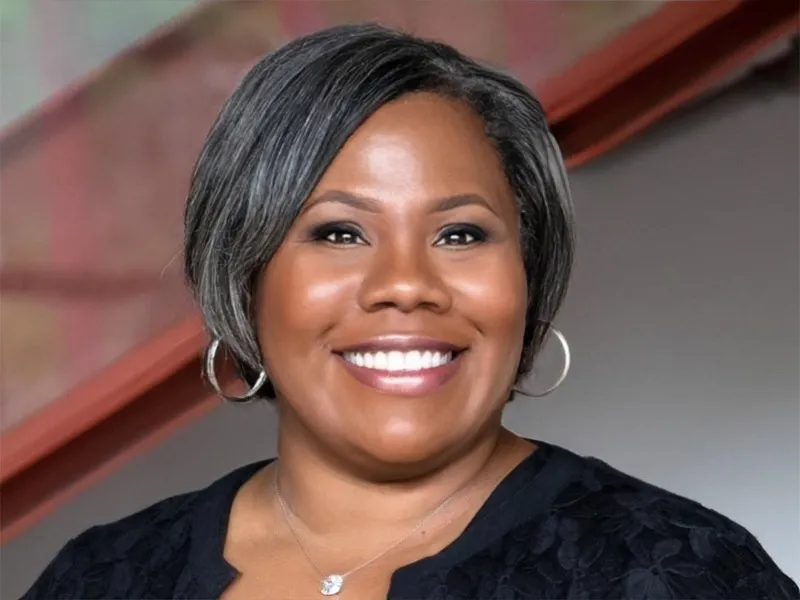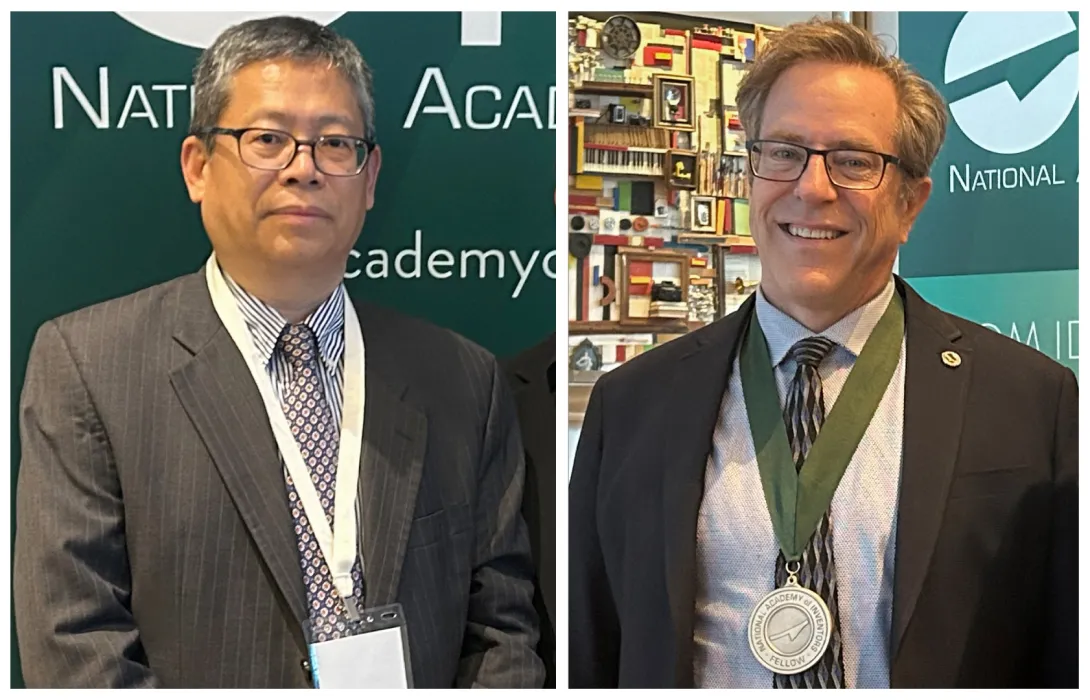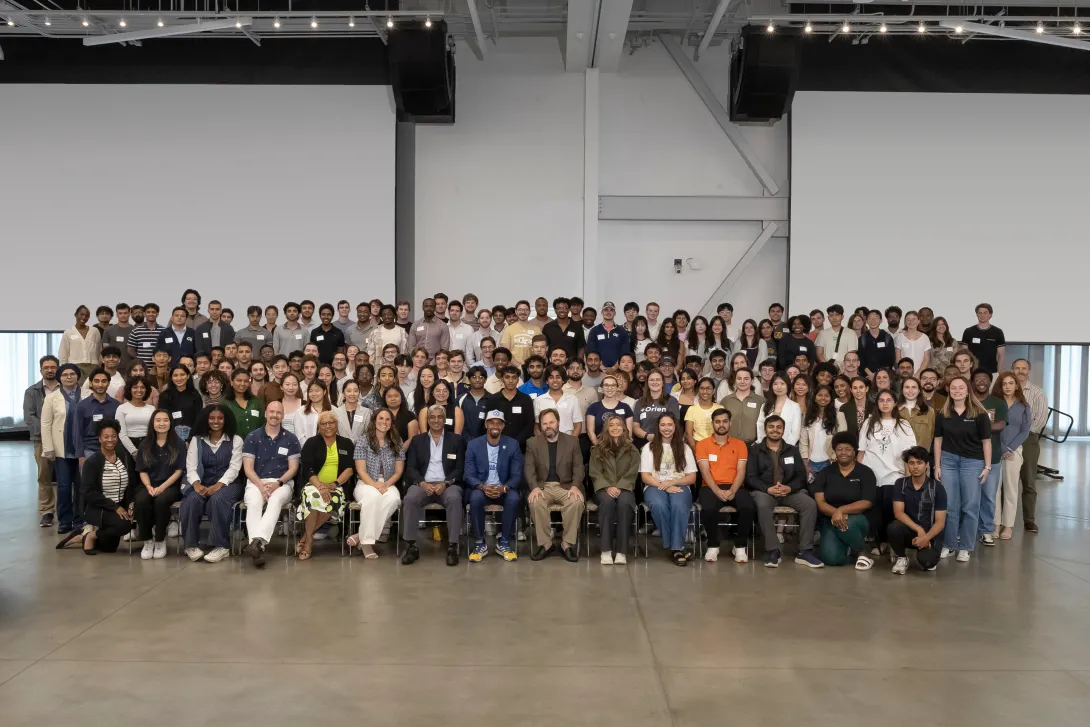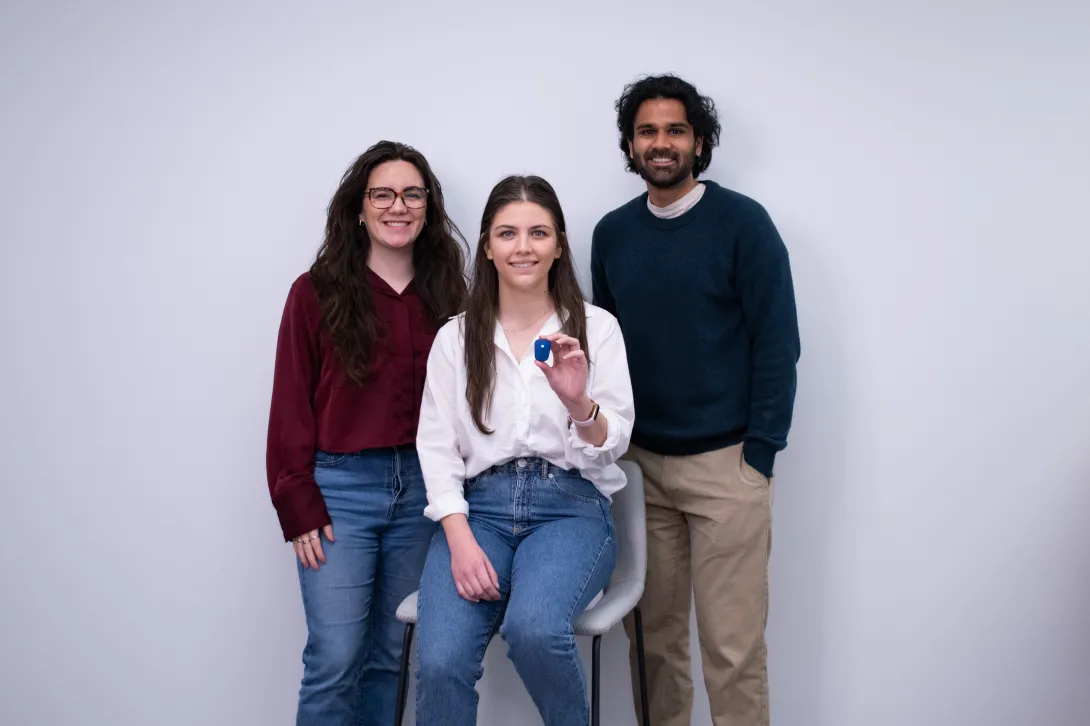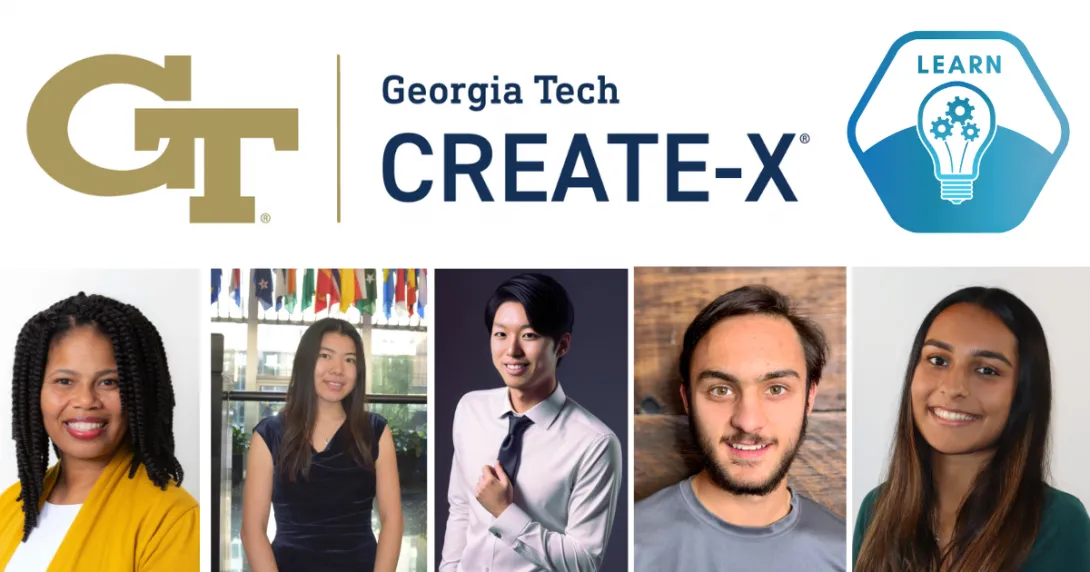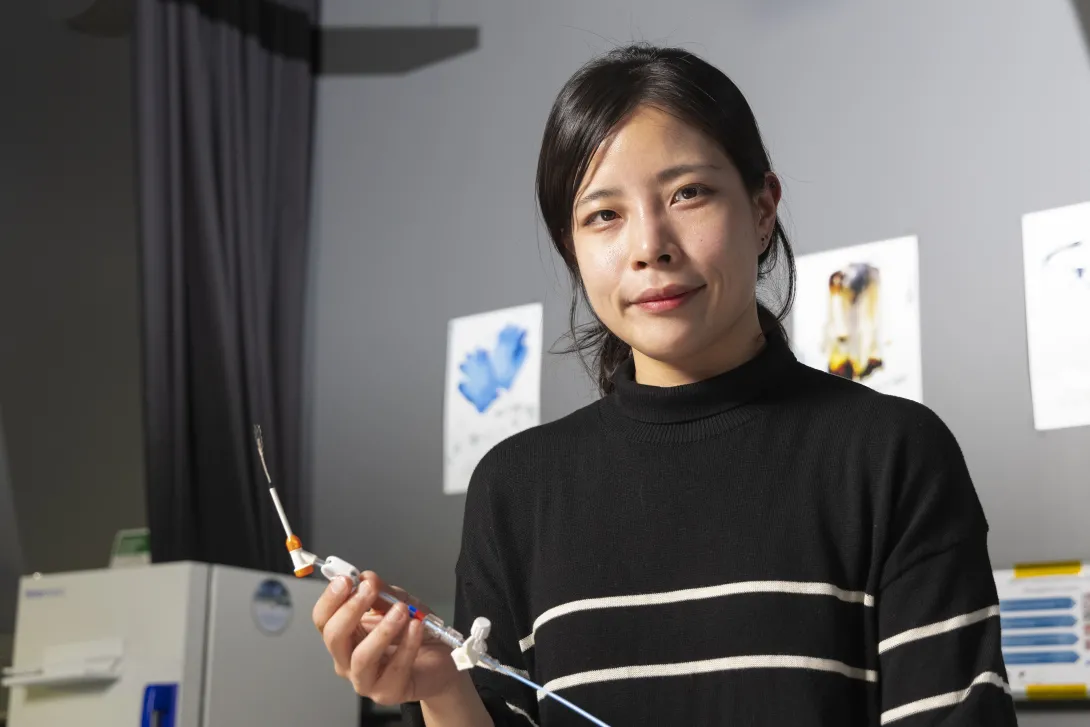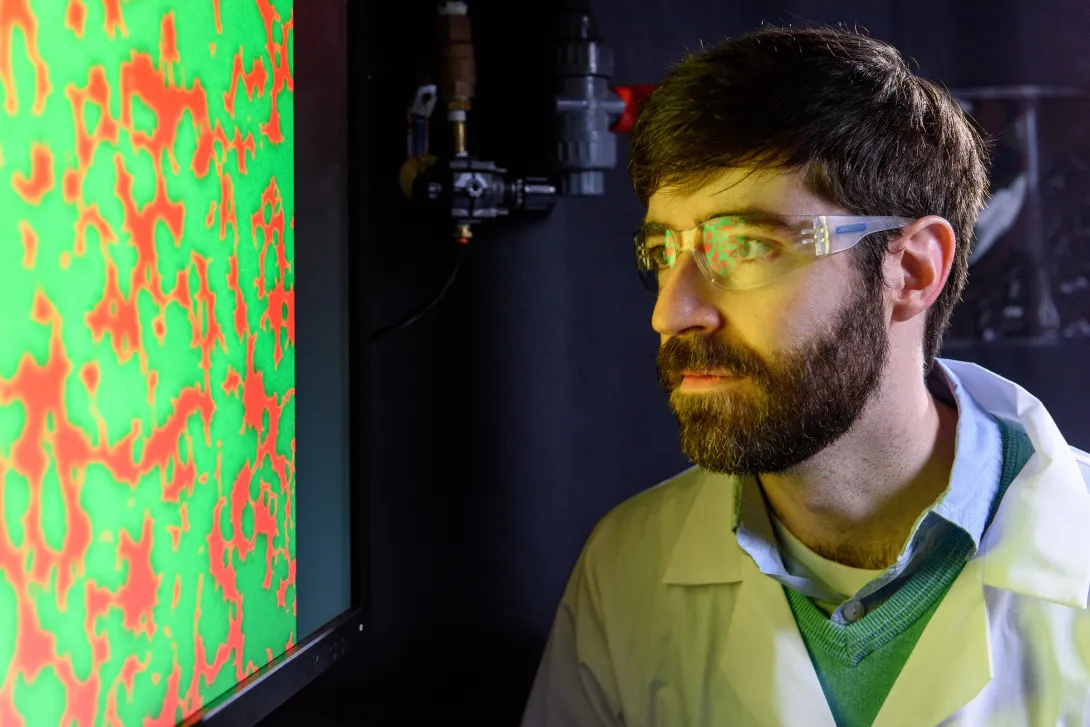Jul. 17, 2025
Candace Washington never thought she’d one day run her own business or teach the next generation of project management leaders in construction and engineering. But that’s exactly what she’s doing thanks to Georgia Tech.
In 2012, Washington, a seasoned construction veteran with 25 years of expertise and a master’s degree in building construction from Georgia Tech, noticed a shortage of project managers. She oversaw capital improvements and construction buildouts nationally and was consistently getting asked by clients to oversee the construction buildouts. This would spark the idea to start her business and launch Cancave Management & Engineering.
Over the next decade, Washington built a successful company and yet she continued to see this recurring shortage of project managers. According to Associated Builders and Contractors, the construction sector still grapples with a significant talent shortage that extends beyond the skilled trades to include construction management positions, with a projected need for nearly half a million additional workers in 2025 alone.
“We have fewer people entering the industry. With the pandemic, we had a great exodus where a lot of people decided to get out of the industry and retire early, and then you have the emerging housing market and infrastructure needs, creating demand for construction in general — the perfect storm,” Washington said.
Determined to find more ways to address the problem, she joined Georgia Tech’s School of Building Construction as a part-time instructor and, in 2024, began pursuing her Ph.D. at Tech, where she learned about the Jim Pope Fellowship.
“Being a Pope Fellow has been transformational to my experience as an entrepreneur,” Washington said. “When I started my company, I wish I had something like this. Through this fellowship, I was able to dig deeper into my idea, validate assumptions, and shape it into a solution that addresses the pain points of labor shortages and compliance bottlenecks in the underutilization or over-utilization of resources.”
As a fellow, Washington was also awarded $15,000 in discretionary funds to support her teaching and entrepreneurial efforts. With the resources from Jim Pope, Washington has been able to make meaningful impacts for students and her company.
Over the last year, she has worked on the next evolution of her business by building Extend the Ladder®, a workforce resource and compliance platform built around an industrywide shared resource model for construction professionals. One application of her platform would allow general contractors to share resources by enabling them to find and coordinate talent from a single database.
In addition to helping her pursue a construction job-matching platform, the fellowship has reinforced her love of teaching and mentoring entrepreneurial-minded students. As a part of the fellowship, Washington taught CREATE-X’s Startup Lab, which teaches the fundamentals of evidence-based entrepreneurship.
One student, Vivianne Akerman, a rising junior in industrial engineering, became Washington’s mentee after her spring Startup Lab class. Bitten by the entrepreneurial bug, Akerman decided to continue her entrepreneurial journey in CREATE-X’s Idea-to-Prototype (I2P) course. She turned an idea into action with guidance from Washington, building a solution for a problem she identified during Startup Lab.
“Candace is an amazing mentor who pushes students to be their best selves,” said Akerman, who is developing a makeup platform designed “to make makeup practical and less overwhelming.” The platform will enable consumers to compare and review products and ultimately find what brands work best for them, given their skin type and desired look.
“I love how positive she is,” adds Akerman. “This is new for me — it’s very exciting but also very overwhelming. She helps me stay focused on my priorities and what’s most important.”
Washington emphasizes that there is no guidebook to becoming an entrepreneur; rather, the path must be discovered through conversations, relationship-building, and learning from the experiences of others.
“This experience deepened my appreciation for the spirit of entrepreneurship — it’s been invaluable for me,” she says. “I would tell anybody who's trying to start a business, you need to go through this process.”
Now, as a mentor herself, Washington credits her fellowship in CREATE-X for giving her the confidence and framework to help others. And she credits her path as a mentor and teacher of entrepreneurship to the home she’s found at Georgia Tech.
Drawing from her own experiences, both the challenges and the triumphs, she offers a piece of advice that she believes aspiring entrepreneurs should carry with them.
“Start now — you don’t need all the answers. Focus on the process, stay committed, and be open to real-world feedback.”
Applications are now open for the 2025 Jim Pope Fellowship until Sept. 2. Interested faculty can learn more at https://create-x.gatech.edu/faculty/jim-pope-fellowship.
News Contact
Written by Anne Wainscott-Sargent
Internal Contact
Breanna Durham
Marketing Strategist
Jul. 11, 2025
Georgia Tech Co-hosts NAI Annual Conference in Atlanta; Two Professors Inducted as NAI Fellows
Georgia Tech, alongside Emory University, the University of Georgia, Georgia State University, and Morehouse School of Medicine, proudly co-hosted the National Academy of Inventors (NAI) 14th Annual Conference from June 23rd to 26th at Loews Hotel in Midtown Atlanta. The flagship event brought together top minds in innovation, with Georgia Tech playing a central role in both content and leadership.
As a host institution, Georgia Tech helped organize and lead plenaries, panels, and the welcome reception, all on the theme of “Forward Together: Innovating With Purpose.” The conference opened with a celebration of art’s influence on scientific discovery. Each host institution presented an artistic element, such as live music, visual art, or interactive showcases. These elements demonstrated their approach to the fusion of creativity and innovation. Georgia Tech’s Michael Dixon from the Central Commercialization Office, Mary Albertson from the Office of Technology Licensing, and Raghupathy “Siva” Sivakumar, Vice President of Commercialization and Chief Commercialization Officer, assisted in preparing conference panels and had speaking roles during the event.
One notable moment at the NAI Conference was Georgia Tech’s recognition as an NAI Top 100 Worldwide University for granted U.S. utility patents in 2024. Georgia Tech Research Corporation ranks 28th with just over 100 patents. According to Dr. Paul R. Sanberg, FNAI, President of the National Academy of Inventors, “The Top 100 Worldwide list showcases the vital role U.S. patents play in moving technologies from bench to marketplace at academic institutions around the globe.”
NAI also recognized its 2024 Class of Fellows, the highest professional distinction awarded exclusively to inventors. The latest cohort comprises 170 inventors from research universities, governmental and non-profit research institutions around the world, including two professors from Georgia Tech: Larry Heck and Younan Xia.
Heck holds a joint appointment in the Schools of Electrical and Computer Engineering and Interactive Computing and serves as executive director of the Machine Learning Center. As an industry leader, he co-created Microsoft’s Cortana virtual assistant, headed Samsung Bixby North America, and led artificial intelligence at Google and Viv Labs. Heck is an IEEE Fellow, holds more than 50 patents, and has amassed nearly 11,000 citations.
Xia holds the Brock Family Chair and is recognized as a Georgia Research Alliance (GRA) Eminent Scholar in Nanomedicine within the Wallace H. Coulter Department of Biomedical Engineering. And, he has joint appointments in the School of Chemistry and Biochemistry and the School of Chemical and Biomolecular Engineering. Xia is the co-inventor of soft lithography, a set of techniques used to create tiny patterns on surfaces, often for manufacturing microchips, sensors, or medical devices. He also made breakthroughs in silver nanowires and gold nanocages with applications in flexible electronics, catalysis, and cancer theranostics. As a globally recognized researcher, Xia has authored around 900 publications, garnered 200,000 citations, holds more than 65 U.S. patents, and has received national and international awards.
Since its founding in 2012, the NAI Fellows program has recognized 22 researchers and inventors from Georgia Tech, including 12 in the last five years.
This year’s NAI Conference theme, “Forward Together: Innovating with Purpose,” focused on how inventors and institutions can collaborate to achieve technological breakthroughs and innovation that create a positive, lasting impact in the world. Georgia Tech leadership provided organizational support and event coordination for the conference. They also participated in panel discussions on topics such as how universities navigate innovation, funding, and faculty support in today's rapidly evolving environment.
Representatives from the United States Patent and Trademark Office, the National Science Foundation, the Department of Energy, and other government departments also participated in the event.
Through the Central Commercialization Office, Office of Technology Licensing, and other strategic guidance, Georgia Tech is committed to supporting innovation, commercialization, and helping inventors secure patents for their ideas. The Institute is ranked in the top 100 of patents issued globally. By co-hosting high-impact national conferences, Georgia Tech continues to solidify its position as a leader in technology and its impact on entrepreneurship. Discover how the Institute is transforming research into real-world applications at commercialization.gatech.edu.
Georgia Tech’s Office of Commercialization is a cornerstone in turning the Institute’s leading-edge research into real-world applications and championing student entrepreneurial pursuits. It comprises four key units: CREATE-X, VentureLab, Quadrant-i, and Technology Licensing. These units empower students and faculty to launch startups, manage intellectual property, and transform research ideas into positive societal impact. Our mission is to accelerate innovation and improve the human condition, solidifying Georgia Tech’s leadership in technology and entrepreneurship.
Jul. 01, 2025
Georgia Tech has launched two new Interdisciplinary Research Institutes (IRIs): The Institute for Neuroscience, Neurotechnology, and Society (INNS) and the Space Research Institute (SRI).
The new institutes focus on expanding breakthroughs in neuroscience and space, two areas where research and federal funding are anticipated to remain strong. Both fields are poised to influence research in everything from healthcare and ethics to exploration and innovation. This expansion of Georgia Tech’s research enterprise represents the Institute’s commitment to research that will shape the future.
“At Georgia Tech, innovation flourishes where disciplines converge. With the launch of the Space Research Institute and the Institute for Neuroscience, Neurotechnology, and Society, we’re uniting experts across fields to take on some of humanity’s most profound questions. Even as we are tightening our belts in anticipation of potential federal R&D budget actions, we also are investing in areas where non-federal funding sources will grow and where big impacts are possible,” said Executive Vice President for Research Tim Lieuwen. "These institutes are about advancing knowledge — and using it to improve lives, inspire future generations, and help shape a better future for us all.”
Both INNS and SRI grew out of faculty-led initiatives shaped by a strategic planning process and campus-wide collaboration. Their evolution into formal institutes underscores the strength and momentum of Georgia Tech’s interdisciplinary research enterprise.
Georgia Tech’s 11 IRIs support collaboration between researchers and students across the Institute’s seven colleges, the Georgia Tech Research Institute (GTRI), national laboratories, and corporate entities to tackle critical topics of strategic significance for the Institute as well as for local, state, national, and international communities.
"IRIs bring together Georgia Tech researchers making them more competitive and successful in solving research challenges, especially across disciplinary boundaries,” said Julia Kubanek, vice president of interdisciplinary research. “We're making these new investments in neuro- and space-related fields to publicly showcase impactful discoveries and developments led by Georgia Tech faculty, attract new partners and collaborators, and pursue alternative funding strategies at a time of federal funding uncertainty."
The Space Research Institute
The Space Research Institute will connect faculty, students, and staff who share a passion for space exploration and discovery. They will investigate a wide variety of space-related topics, exploring how space influences and intersects with the human experience. The SRI fosters a collaborative community including scientific, engineering, cultural, and commercial research that pursues broadly integrated, innovative projects.
SRI is the hub for all things space-related at Georgia Tech. It connects the Institute’s schools, colleges, research institutes, and labs to lead conversations about space in the state of Georgia and the world. Working in partnership with academics, business partners, philanthropists, students, and governments, Georgia Tech is committed to staying at the forefront of space-related innovation.
The SRI will build upon the collaborative work of the Space Research Initiative, the first step in formalizing Georgia Tech’s broad interdisciplinary space research community. The Initiative brought together researchers from across campus and was guided by input from Georgia Tech stakeholders and external partners. It was led by an executive committee including Glenn Lightsey, John W. Young Chair Professor in the Daniel Guggenheim School of Aerospace Engineering; Mariel Borowitz, associate professor in the Sam Nunn School of International Affairs; and Jennifer Glass, associate professor in the School of Earth and Atmospheric Sciences. Beginning July 1, W. Jud Ready, a principal research engineer in GTRI’s Electro-Optical Systems Laboratory, will serve as the inaugural executive director of the Space Research Institute.
To receive the latest updates on space research and innovation at Georgia Tech, join the SRI mailing list.
The Institute for Neuroscience, Neurotechnology, and Society
The Institute for Neuroscience, Neurotechnology, and Society (INNS) is dedicated to advancing neuroscience and neurotechnology to improve society through discovery, innovation, and engagement. INNS brings together researchers from neuroscience, engineering, computing, ethics, public policy, and the humanities to explore the brain and nervous system while addressing the societal and ethical dimensions of neuro-related research.
INNS builds on a foundation established over a decade ago, which first led to the GT-Neuro Initiative and later evolved into the Neuro Next Initiative. Over the past two years, this effort has culminated in the development of a comprehensive plan for an IRI, guided by an executive committee composed of faculty and staff from across Georgia Tech. The committee included Simon Sponberg, Dunn Family Associate Professor in the School of Physics and the School of Biological Sciences; Christopher Rozell, Julian T. Hightower Chaired Professor in the School of Electrical and Computer Engineering; Jennifer Singh, associate professor in the School of History and Sociology; and Sarah Peterson, Neuro Next Initiative program manager. Their leadership shaped the vision for a research community both scientifically ambitious and socially responsive.
INNS will serve as a dynamic hub for interdisciplinary collaboration across the full spectrum of brain-related research — from biological foundations to behavior and cognition, and from fundamental research to medical innovations that advance human flourishing. Research areas will encompass the foundations of human intelligence and movement, bio-inspired design and neurotechnology development, and the ethical dimensions of a neuro-connected future.
By integrating technical innovation with human-centered inquiry, INNS is committed to ensuring that advances in neuroscience and neurotechnology are developed and applied ethically and responsibly. Through fostering innovation, cultivating interdisciplinary expertise, and engaging with the public, the institute seeks to shape a future where advancements in neuroscience and neurotechnology serve the greater good. INNS also aims to deepen Georgia Tech’s collaborations with clinical, academic, and industry partners, creating new pathways for translational research and real-world impact.
An internal search for INNS’s inaugural executive director is in the final stages, with an announcement expected soon.
Join our mailing list to receive the latest updates on everything neuro at Georgia Tech.
News Contact
Laurie Haigh
Research Communications
May. 30, 2025
CREATE-X, Georgia Tech’s premier entrepreneurship program, kicked off its 12th Startup Launch cohort this month with a record-breaking 137 student teams and 25 faculty and research teams — totaling 318 founders. The summer-long accelerator, known for turning ideas into real-world ventures, is once again positioning Georgia Tech as a national leader in invention and startup creation.
This year’s cohort spans a wide range of industries, including artificial intelligence, defense, healthcare, gaming, sustainability, media management, agriculture tech, fashion tech, education, and more.
“These founders are in the messy middle and that's a beautiful place to be. There’s a lot of freedom in that,” said Margaret Weniger, director of Startup Launch. “We’re all going to be in this together. It's a safe space to try new things. It’s OK if it doesn't work out because what we want founders to learn is an entrepreneurial mindset and entrepreneurial spirit — something you take with you no matter what you do after this.”
Over the next 12 weeks, teams will validate ideas, build products, and acquire customers with the help of dedicated coaches, a robust founder community, and a network of mentors and alumni.
Raghupathy "Siva" Sivakumar, Georgia Tech’s inaugural vice president of Commercialization and the faculty founder of CREATE-X, spoke about the core of CREATE-X and what it would take for founders to succeed.
“Startup Launch is not about Georgia Tech gaining from your success. We are here just for one reason, which is to make you successful,” he said. “You need to hold yourself accountable. You need to be ambitious in terms of how big a problem you solve. You need to be emphatic that the customer matters. The successful teams are 100% behind what's going to make the lives of customers easier and better.”
In 2014, CREATE-X was co-founded by Sivakumar, Steve McLaughlin(who is now the president of The Cooper Union for the Advancement of Science and Art), and other Georgia Tech faculty, including Ray Vito, Craig Forest, and Ravi Bellamkonda (who is now the executive vice president and provost of The Ohio State University). The program received its initial major philanthropic support from Chris Klaus, a Georgia Tech alumnus and tech entrepreneur, whose gift helped launch the initiative, and , played a key role in building out the program's maker courses. Over the years, CREATE-X has continued to grow, thanks largely to the philanthropic support of alumni and foundations who believe in its mission.
In the last decade, the program has produced over 650 startups, $2.4 billion in portfolio valuation, and had eight founders named to Forbes’ 30 Under 30. Wagner shared stories of past teams who pivoted dramatically — from a glucose-monitoring pillow to a sobriety app now valued at over $350 million, and from a camping gear delivery service to a billion-dollar logistics platform.
“We don’t know which ideas will become the next unicorns,” Weniger said. “But we’re betting on you.”
At the kickoff event, McLaughlin and Klaus were honored for their contributions to Georgia Tech’s entrepreneurial ecosystem. McLaughlin encouraged the founders through the story of CREATE-X.
“From the very beginning, we challenged CREATE-X to be a startup as well. To this day, CREATE-X has raised its own money to do this. It's a reminder of what it takes to make this happen,” he said. “This is the most difficult challenge you have ever taken. I think at the time, we were probably skeptical about whether students could do it. Now we know that you can.”
Georgia Tech President Ángel Cabrera reflected on the impact of McLaughlin, Klaus, and others who saw the vision of Georgia Tech being an entrepreneurial campus.
“Ten years ago, this was a crazy, absurd idea,” he said. “Now, 150 teams are working on their own crazy ideas. Even though sometimes there's this idea of the entrepreneur as a loner, what you learn very quickly is entrepreneurship is a team sport.”
Klaus spoke about people collaborating and helping solve problems together.
“I'm especially inspired by Georgia with its complex history,” he said. “It continues to be a place where peace can be envisioned and pursued. I think this recognition strengthens my commitment to building bridges, resolving conflict, and lifting up voices that seek unity. As you build your businesses, you'll be building collaborations and partnerships, and hopefully make the world a better place.”
As the summer progresses, founders will be guided by CREATE-X’s core values: experiential education, entrepreneurial confidence, and real-world impact. Weniger encouraged teams to “show up uncomfortable” and “leverage every single resource” available.
The journey will culminate at Demo Day, where teams will showcase their startups to investors, industry leaders, and the broader community. The event is free, open to the public, and promises a front-row seat to the next wave of Georgia Tech-born innovation.
Demo Day 2025 will take place on Thursday, Aug. 28, at 5 p.m., in the Exhibition Hall. For more information and to RSVP, visit the CREATE-X Demo Day Eventbrite.
News Contact
Breanna Durham
Marketing Strategist
May. 15, 2025
Jonathan Goldman Named Director of Quadrant-i
Jonathan Goldman has been appointed the director of Quadrant-i (Q-i) in the Office of Commercialization. Quadrant-i supports faculty, researchers, and students in translating research into startups. Under Goldman's leadership, Quadrant-i will offer a comprehensive suite of programs, resources, and services to enhance the commercialization journey for Georgia Tech’s innovations. His leadership will focus on fostering a collaborative environment that encourages innovation and accelerates the transition from idea to impact.
A seasoned entrepreneur and commercialization expert, Goldman transitioned to Quadrant-i after a significant tenure with VentureLab, another key commercialization unit at Georgia Tech. During his initial years at VentureLab from 2002 to 2007, Goldman assisted in developing more than 10 companies that collectively attracted $300 million in funding. He was instrumental in forming the solar firm Suniva, later serving as its director of business development. After returning to VentureLab, he continued to foster entrepreneurial success among Georgia Tech researchers. Now at Quadrant-i, he is committed to advancing the Institute’s mission by transforming groundbreaking research into commercially successful enterprises.
“As Georgia Tech continues to grow as a leader in commercialization and entrepreneurship, Jonathan Goldman’s leadership at Quadrant-i will be instrumental in transforming cutting-edge research into high-impact opportunities. His expertise in venture creation and research translation will accelerate innovation, driving meaningful economic and technological advancement,” said Ragupathy “Siva” Sivakumar, chief commercialization officer and vice president of Commercialization at Georgia Tech.
In his new role, Goldman will drive Qi’s strategic efforts to transition research breakthroughs into successful ventures. His vision includes enhancing Georgia Tech’s capacity to convert pioneering discoveries into thriving spinouts and funded startups while invigorating the local tech ecosystem.
His appointment comes at a pivotal moment, with a surge of entrepreneurial activity among faculty and Ph.D. students at Georgia Tech, fueled by the ambition to make a significant societal and economic impact. Under his leadership, Qi will introduce programs and strategies to streamline the commercialization process and build a robust network of business and entrepreneurial talent.
Goldman holds a bachelor’s degree in aeronautics and astronautics from MIT and a master’s degree in metallurgy from Georgia Tech. His career includes significant roles in startup ventures and commercialization projects. Additionally, he co-founded and led the MIT Enterprise Forum of Atlanta and is active with the Materials Research Society.
About Georgia Tech Office of Commercialization
Georgia Tech Commercialization is a cornerstone in transitioning the Institute's leading-edge research into real-world applications. It encompasses four pivotal units: CREATE-X, VentureLab, Quadrant-i, and Technology Licensing. These units empower students and faculty to launch startups, provide comprehensive commercialization support, manage intellectual property, and facilitate the transformation of research into viable businesses. Our mission is to provide world-class commercialization services, catalyzing research and innovation to improve the human condition and solidify Georgia Tech's position as a leader in technology and entrepreneurial impact.
Apr. 25, 2025
According to the National Institutes of Health, nearly one-fourth of the U.S. population over age 45 suffers from foot and ankle issues, which reduce their quality of life, adversely affect walking and other daily functions, and increase the risk of falls.
For orthopedic patients recovering from surgery, walking properly can speed recovery, enabling them to more quickly regain mobility and quality of life. Walking issues or problems with one’s gait can also indicate larger medical problems, from vascular disease to brain, nerve, or spinal cord injuries.
Three alumni from Georgia Tech’s School of Electrical and Computer Engineering and School of Bioengineering hope to help doctors and patients analyze walking patterns through their wearable sensor startup, StrideLink.
“In the same way a cardiologist puts an EKG on you to monitor your heart, we essentially have designed that for walking ability,” says StrideLink founder and CEO Marzeah “Zea” Khorramabadi.
Initially targeting orthopedic practices for their platform, the HIPAA-compliant system wirelessly analyzes patients’ gaits to help doctors remotely monitor their walking ability before and after surgery to better address issues and provide more personalized treatment.
The 26-year-old Georgia Tech graduate of computer engineering founded StrideLink in 2021 with two other Tech students: Cassandra McIltrot, a 2022 biomedical and medical engineering graduate, and Neel Narvekar, who completed his computer engineering studies in 2021.
Since starting StrideLink, the three have raised just under $1 million in pre-seed funding and are now starting their seed funding push.
McIltrot, 24, serves as research director at StrideLink. She says talking to surgeons, physical therapists, and patients was invaluable in building the StrideLink platform, which includes a physical sensor that connects via Bluetooth to a mobile platform. Orthopedic physicians can then access a secure interface to view their patients’ gait data.
“Being able to learn from all those people helped us build something that will bring value,” she says.
Narvekar, the startup’s CTO, calls the technology “a game-changer,” noting, “For the first time, we can widely collect clinically relevant gait data. Starting in orthopedics, this means we can build datasets to predict recovery timelines, identify when patients are off track, and intervene before adverse events occur. Ultimately, this will pave the way for improved care across a range of health conditions."
The enterprising entrepreneurs didn’t do it alone. They leveraged CREATE-X, which supports students in launching successful startups through education, coaching, funding, and other resources.
Below, Khorramabadi and McIltrot share more about their journey as members of the first cohort of CREATE-X’s Female Founders program in Fall 2020. In Summer 2021, the duo completed Startup Launch, a 12-week summer accelerator that helps students launch startups.
Did you two always want to start your own business?
Khorramabadi: It was kind of inevitable for Cassie and me. My dad immigrated from Iran and met my mom here. He started his own business selling cars. So, I grew up with a family that was running a small business. I’ve always had that in me, and it was the expectation that I would go to college. I picked Georgia Tech specifically because they had showcased the CREATE-X program during the tour.
McIltrot: My dad had a construction consulting business, and my mom was a nurse. That’s where the medical influence came from for me. He’s also an engineer. The summer that we decided to pursue this, I was doing research on stroke rehab at Emory.
How did you come up with your big idea?
Khorramabadi: In the middle of the pandemic, there was a lot of emphasis on technology — leaving the clinic and being in a patient's home. How are we going to deliver healthcare effectively when patients aren't directly in front of their doctor?
At the same time, Cassie was doing stroke research, and there was a lot around how heavily walking ability, walking patterns, or your gait is affected. We talked to healthcare professionals, physical therapists, surgeons, everyone. And it was clear that there was a pretty big gap in the market in terms of the technology that would serve these patients who have any symptoms that show up in their walking ability. It wasn’t measured at all. So, we ended up landing on a gait monitor as a solution.
We realized there was a very immediate, straightforward need for our product in orthopedics. If you're getting a knee replacement, ankle, or foot surgery, it's valuable to be able to put this product on a patient preoperatively to better prepare them for surgery. Surgeons can take real measurements of what their patients’ walking ability looks like before surgery and then track them throughout the entirety of their post-op recovery, which can be three months, six months, or even 12 months.
How does the solution work?
Khorramabadi: We designed our platform from the ground up. Our physical sensor connects to a mobile application. That mobile application connects to an entire cloud architecture that has processing servers and database storage. On the physician side, we have an interface for them to view data that fits into their workflow, including receiving insurance reimbursement. The technology component was designed in-house by Neil and me, given our backgrounds in computer engineering.
Are you using AI or advanced analytics in your platform?
Khorramabadi: We have a lot of very advanced data processing methods that are entirely proprietary to our system. We’ve acquired enough data from all of the patients we've seen with Emory, and now we're tracking patients remotely, where we are starting to use real clinical data to train AI to deliver a performance score to these patients. It’s essentially one number that rates how you’re doing related to a healthy or normal gait. We're already using AI right now, and that's something that's going to be released with our product within the next six months.
Where are you in terms of product maturity?
Khorramabadi: We recently started with our first fully remote full-time customer. Before that, we were doing research with another physician at Emory, where they had used it for over a year. At this point, they've tracked over 250 patients, where they put the sensors on at their pre-op appointment and then track them during post-op follow-ups.
They weren’t sent home with the sensors until our sensor was FDA-listed last year, and then we started our first pilot with a private practice in Amelia Island, Florida, last October. That has gone incredibly well, so we just expanded to an orthopedic practice in Alabama, and we should be getting two more practices started in 2025. We've solidified the product fit, and we’re now at the point of scaling it. We also have a research partnership with Children's Hospital Colorado to work on a pediatrics application.
What was most helpful about the CREATE-X programs you participated in at Georgia Tech?
Khorramabadi: Georgia Tech makes exploring doing a startup easy and low-risk for any student. The fact that it was so accessible was monumental early on. In terms of programming, the most valuable part was the emphasis on customer discovery. They did a good job, saying, “You don't know what to build until you talk to enough customers.”
We needed a mentor as part of our first startup class, and we read how James Stubbs, a tenured professor in biomedical engineering, was a previous founder. He’d done a couple of medical device companies that had been acquired. At our first meeting, he told us we need to talk to people. From a business standpoint, it made more sense for us to go to orthopedics rather than physical therapy for a whole host of reasons. But the biggest takeaway of talking to customers was a very consistent experience with both the Startup Launch and the Female Founders program.
McIltrot: The Female Founders program did a fantastic job of that, where we set goals as teams and were encouraged to talk to as many people we think are going to be our customers. We then met as a group and presented what we learned.
So you have to get out of get out of your comfort zone, and not be shy about engaging with people. Cassie, what was the big benefit for you?
McIltrot: We were the first cohort for Female Founders. We checked in every week with our team. Everyone would talk about what they learned that week while talking to people. We were the only medical-focused startup in the program, but being able to share the experience of how we approached people allowed us to learn from each other. We like keeping up with each other on LinkedIn. We learned one of the people in our cohort just closed a funding round.
Is having a community of other women entrepreneurs helpful?
Khorramabadi: Definitely. We’ve gotten a lot out of building a network, especially coming from starting this out of college, where you don't have any industry connections built up yet.
What has been the biggest value from your experience participating in Startup Launch?
Khorramabadi: Networking has been the biggest value for both Startup Launch and Female Founders. Both of those programs emphasized networking and customer discovery. Being involved in both programs at the same time kept us focused on that.
Startup Launch was a good crash course in how you set up your company from a legal aspect, as well as the conversations you need to have with your co-founders, and this is how you pitch and how you raise investment. All these topics are very foreign, and there's not a lot of good information out there on them. So, it was important to have that in the program. It was also nice to connect with Georgia Tech founders who had started companies and seen some success. The program brought them in to talk to us and share what they'd learned. It was nice to have that extra guidance.
What is the biggest benefit of your innovation?
Khorramabadi: The biggest value is knowing how you're doing right now, and also, if you're not doing well, your physician being able to make changes quickly to your plan of care. The platform also lets patients realize what may be contributing to their getting reinjured or having a slower recovery.
What has been the impact of your platform to date?
Khorramabadi: We've already seen the immediate ROI in terms of patients just feeling much better and much more comfortable in their recovery and being able to push themselves a little bit further than they would have otherwise, because they know they have this product that's tracking them, and they know their physician also is tracking them.
On the physician side, there's a lot of incentive for them, because they see this as a tool to stay connected with their patients, which is incredibly valuable for them for delivering the best care or best experience for those patients. Also, this product is now covered by Medicare, CIGNA, and United Healthcare.
McIltrot: One of the things we have heard from patients is they’re using this to instill confidence in their walking ability and their recovery. Because these recovery timelines could be six months to a year to multiple years long, being able to have something that shows how much you've been able to improve is invaluable.
Our future vision is being able to put this on a patient and have a projected recovery laid out. One day, this device could provide recommendations on what went wrong and how to fix it. Being proactive with the care that we deliver to patients is the end goal.
Any advice for Georgia Tech students thinking about taking an innovative idea to market?
Khorramabadi: Go for it. Startups are always a risk, and Georgia Tech provides you with a safety net to take that risk. If you have an idea on how to solve a problem, why wait? Don't hesitate.
If you are looking for a supportive community to help you start your entrepreneurial journey, applications for the Female Founders Program are open until May 19 for Summer 2025. Apply for Female Founders today and over the summer learn entrepreneurship from an all-female coaching team, network with experts and successful entrepreneurs, build your network, and access funding to kick off a startup. Admissions are rolling.
For those interested in seeing the latest startups coming out of CREATE-X, join us for Demo Day 2025! On Aug. 28 at 5 p.m., over 100 startups will fill Exhibition Hall, debuting technologies from clean tech to fashion. Register today for this free event that attracts over 1,500 attendees, from business leaders to enthusiasts, and see how our founders are tackling issues across industries.
News Contact
Written By Anne Wainscott-Sargent
Internal Contact:
Breanna Durham
Marketing Strategist
Apr. 16, 2025
What’s the hottest thing in electronics and high-performance computing? In a word, it’s “cool.”
To be more precise, it’s a liquid cooling system developed at Georgia Tech for electronics aimed at solving a long-standing problem: overheating.
Developed by Daniel Lorenzini, a 2019 Tech graduate who earned his Ph.D. in mechanical engineering, the cooling system uses microfluidic channels — tiny, intricate pathways for liquids — that are embedded within the chip packaging.
He worked with VentureLab, a Tech program in the Office of Commercialization, to spin his research into a startup company, EMCOOL, headquartered in Norcross.
“Our solution directly addresses the heat at the source of the silicon chip and therefore makes it faster,” Lorenzini said. “Our design has our system sitting directly on the silicon chips that generate the most heat. Using the fluids in the micro-pin fins, it carries the heat that’s produced away from the chip.”
That cooling solution is directly integrated into the electronic components, making it significantly more efficient than conventional cooling methods, because it enhances the heat dissipation process.
The result is a much lower risk of overheating and reduced power consumption, he said.
Lorenzini, who researched and refined the technology in the lab of Yogendra Joshi at the George W. Woodruff School of Mechanical Engineering, was awarded a patent for the technology in September 2024.
Now, EMCOOL, which has five empoloyees, is actively pursuing venture capital funding to scale its technology and address the escalating thermal management challenges posed by AI processors in modern data centers.
The system uses a cooling block with tiny, pin-like fins on one side and a special thermal interface material on the other. There's also a junction attached to the block, with ports for the fluid to flow in and out. The cooling fluid moves through the micro-pin fins and helps to carry away the heat.
Since the ports are designed to match the shape of the fins, it ensures that the fluid flows efficiently and the heat is dissipated as effectively as possible at chip-scale.
As electronic devices — from high-performance personal computers to data centers used for artificial intelligence processing — become more powerful, they generate more heat. This excess heat can damage components or cause the device to underperform.
Traditional cooling methods, which include fans or heat sinks, often struggle to keep pace with the increasing demands of the newer model electronics. Lorenzini’s microfluidic system addresses the challenge of overheating with his patented, more effective, compact, and integrated cooling solution.
With the guidance of Jonathan Goldman, director of Quadrant-i in Tech’s Office of Commercialization, Lorenzini secured grant funding through the National Science Foundation and the Georgia Research Alliance to further the research and build design prototypes.
“We immediately had the sense there was commercial potential here,” Goldman said. “Thermal management, or getting rid of heat, is a ubiquitous problem in the computer industry, so when we saw what Daniel was doing, we immediately began to engage with him to understand what the commercial potential was.”
Indeed, the initial focus for the technology was the $159 billion global electronic gaming market. Gamers need a lot of computing power, which generates a lot of heat, causing lag.
But beyond gaming systems, the company, which manufactures custom cooling blocks and kits at its Norcross facility, is eyeing more sectors, which also suffer from overheating, Goldman said.
The technology addresses similar overheating electronics challenges in high-performance computing, telecommunications, and energy systems.
“This work propels us forward in pushing the boundaries of what traditional cooling technologies can achieve because by harnessing the power of microfluidics, EMCOOL's systems offer a compact and energy-efficient way to manage heat,” Goldman said. “This has the potential to revolutionize industries reliant on high-performance computing, where heat management is a constant challenge.”
News Contact
Péralte C. Paul
peralte@gatech.edu
404.316.1210
Apr. 04, 2025
Four students from Startup Lab have been selected to join the 2025 immersive cohort at South by Southwest (SXSW) in Austin, Texas. Alex Aridgides (mechanical engineering and economics), Shinhai Chen (industrial engineering), Varuni Chopra (industrial engineering), and Christie Peng (computer science) are the first Georgia Tech students to be invited to the program.
The weeklong, all-expenses-paid program offers university-affiliated innovators the chance to refine their innovations, engage in customer discovery, and network with industry leaders and peers at SXSW. The annual festival celebrates technology, film, music, education, and culture. Students participated in a competitive application process, which involved submitting applications, meeting specific evaluation criteria, and being selected by a panel of industry experts, mentors, and SXSW organizers.
Yolanda Payne, the students’ Startup Lab instructor, presented the SXSW opportunity in class.
"My goal is to be their biggest cheerleader,” she explained. “I had great teachers who helped me get to where I am today, and I strive to emulate their support. I’m always willing to guide students toward new opportunities."
She learned about the SXSW immersive cohort from Nakia Melecio, director of the National Science Foundation I-Corps Southeast Hub. The $15 million initiative crosses nine major research universities in the southern U.S. and accelerates the translation of deep tech research into commercial ventures. The hub works closely with entrepreneurial faculty, students, and researchers to equip them with the tools, networks, and support to bring their innovations to market.
Melecio plays a central role in identifying and advancing strategic opportunities for university partners and their entrepreneurial teams. “When the opportunity to participate in SXSW arose, I recognized it as an ideal platform to showcase the talent and innovation coming out of our region.”
Melecio added that Startup Lab is ideal for amplifying NSF I-Corps’ goals because of the course’s proven track record of fostering hands-on learning and commercialization readiness. “Startup Lab helps prepare students not just to think entrepreneurially, but to act on their ideas with confidence and a structured path forward. It was a natural fit for this opportunity.”
Payne says the experience students gained in Startup Lab helped prepare them for the immersive cohort. “The knowledge is being solidified by an experience you’re having in my class and the real world.”
Chopra agrees that Startup Lab teaches essential business development fundamentals and customer discovery principles, skills that are relevant to the SXSW program. She recommends the course to other students and emphasizes the value of combining engineering or technical backgrounds with entrepreneurship skills.
“We take a lot of classes that are directly related to our major, and they're very technical. But when it comes to wanting to start something of your own or even understanding how startups work, it's completely different than the rest of our coursework.”
Startup Lab is a three-credit course that focuses on evidence-based entrepreneurship. This hands-on class covers ideation, teamwork, customer discovery, minimum viable products, the business model canvas, and other topics. Students learn how to launch a startup by integrating in-class lectures with practical, out-of-class activities, including interviewing potential customers and refining their startup ideas based on real-world feedback.
The program provides access to valuable resources, mentorship from seasoned entrepreneurs, and a supportive community to help students develop their startups. Startup Lab and NSF I-Corps are also exploring other industry showcases for student entrepreneurs like SXSW.
Chen chose Startup Lab to pursue his entrepreneurial interests. “I knew that Georgia Tech had a really good startup culture, so I researched what they had to offer, and Startup Lab was the first step." He also noted Payne's impact as an instructor. "The best part is how much she cares about the topic. She has a lot of background knowledge and is passionate.”
Startup Lab is unique because it "de-risks the business model,” Payne says. Many entrepreneurs first build their products and then talk to potential customers. However, Startup Lab students perform customer discovery, sharing their ideas with potential end users, listening to their needs and feedback, and then building the product.
Peng recalls a powerful moment of pitching an idea for an app to streamline MARTA operations. “I had a fun time coming up with this idea. We learned a lot about interviewing, coming up with possible solutions, and refining our idea,” she says. "Being surrounded by so many brilliant individuals at Georgia Tech makes it easy to get idea formation or networking connections you need for your idea to succeed."
Aridgides has ambitious post-program goals, envisioning creating change through entrepreneurship. "I want to start a company to change the world for the better and make a big impact. That's my life goal. I think through a company, I can achieve that."
Payne reminds students that they possess something many adults lack: time to explore different ideas. She also says Startup Lab can help students value and see their ideas in new ways.
“They don't recognize that the product they're working on could be pursued through entrepreneurship or think of themselves as entrepreneurs. And even if they don't pursue it, it helps them in all aspects of life because business and capitalism are part of what we do every day.”
If you’re a student interested in adding entrepreneurship to your course schedule, registration for the summer and fall semesters opens on April 15. In addition to Startup Lab, students also have the opportunity to build a prototype with support through Idea to Prototype and CREATE-X Capstone Design.
News Contact
Contact
Article by Alyson Key
CREATE-X Contact:
Breanna Durham
Marketing Strategist
Apr. 02, 2025
Annually, traumatic brain injuries (TBI) cause half a million permanent disabilities and 50,000 deaths. Monitoring pressure inside the skull is key to treating TBI and preventing long-lasting complications. Most of these monitoring devices are large and invasive, requiring surgical emplacement. But Georgia Tech researchers have recently created a sensor smaller than a dime. The miniature size offers huge benefits.
Mar. 28, 2025
Peter Yunker boils down his advice for researchers wanting to commercialize their lab advances.
“You can’t go it alone,” said Yunker, an associate professor of physics at Georgia Tech.
In January, Yunker co-founded the biotechnology startup TopoDx LLC, with David Weiss, an Emory University School of Medicine researcher and director of the Emory Antibiotic Resistance Center, and Yogi Patel, a Georgia Tech alumnus with a background in business development and bioengineering.
“Researchers often think that they have a good commercialization idea to help people, but that alone does not guarantee success,” said Yunker. “Look for partners with complementary skills who understand aspects of the commercialization process that you don’t. Find mentors with business and scientific backgrounds in the specific industry you want to enter.”
TopoDx has developed a microbial test to identify antibiotic resistance and susceptibility rapidly and accurately. Current tests produce a result in three to five days. TopoDx’s approach can gain a result within four hours. Every hour counts in treating serious infections. Delays in accurate treatment can increase antibiotic resistance, which is a global challenge, causing up to 1 million deaths a year.
The company’s testing method was inspired by a fundamental biophysics project in Yunker’s lab. His team was interested in understanding how bacterial colonies behave. They tested white-light interferometry, a technology that can measure bacterial colonies down to the nanometer level.
“White-light interferometry allowed us to identify changes in the topography of a colony that indicated larger changes in the volume of cells in the entire colony,” said Yunker. “We thought this might have practical applications.”
The next step was giving research talks at meetings and looking for collaborators. “I wanted to find someone with expertise on the bacteriology side, and I was very fortunate to meet David Weiss,” Yunker said, noting his proficiency in heteroresistance, a phenomenon where a small subset of a bacterial colony resists an antibiotic.
“If you have just one antibiotic-resistant cell in a hundred cells, it can cause treatments to fail,” said Yunker.
The two collaborators hoped to commercialize their technology, identifying heteroresistance in microbial samples. However, they needed guidance in creating a business model. They consulted Harold Solomon, an entrepreneur with Georgia Tech VentureLab and a principal in the Quadrant-i program, a specialized program helping Georgia Tech faculty and students commercialize research.
Solomon became a key mentor. He guided them away from an ill-advised partnership and instead introduced them to Yogi Patel, who became a co-founder and the company CEO.
This new collaboration provided the team with an important lesson — one that Yunker passes along to other researchers looking to commercialize their discoveries. “Seek expertise outside your field, be humble about your knowledge limitations, and view collaboration as a strategic partnership,” he says.
When Patel came on board, he conducted extensive interviews with more than 15 clinical professionals.
“You need to interview end users or purchasers of whatever solution you want to build,” said Patel. “Ask them if the problem you think you may have solved is a problem with scale, with a market need.”
Clinicians, Patel learned, did not see heteroresistance as a significant issue. Instead, the slow pace of antibiotic testing was identified as a major problem. Faster testing could allow clinicians to prescribe targeted drugs more quickly and accurately, reducing unnecessary antibiotic use and the risk of multi-resistant infections.
With this survey information, Patel asked Yunker and Weiss to rethink how their technology could be commercialized.
“A company must solve a real-world problem,” said Patel. “I recommended that we switch from heteroresistance to solving slow antibiotic testing. We could keep heteroresistance as something we can still do as a second or third priority.”
TopoDx’s new technology can measure, with single-nanometer accuracy, how bacterial colonies are responding to antibiotics in real time. This method could revolutionize how antibiotics are tested and prescribed. Testing would be conducted on a countertop device about the size of a large microwave. The co-founders envision the device as eventually being used by urgent care facilities and hospitals.
“We want to make microbial testing susceptibility accessible anywhere and everywhere,” said Patel.
Adam Krueger, once a Ph.D. student in Yunker's lab, has continued to refine the technology. Now a post-doctoral researcher, Krueger joined TopoDx in a technical leadership role to expand the technology’s capabilities for microbiological diagnostics.
“We will keep pushing the envelope forward scientifically while we try to commercialize the accomplishments that we have already made,” Yunker said. “We hope that some fundamental studies we are doing now out of scientific curiosity could lead to further commercial applications.”
Georgia Tech faculty members and graduate students, join the Quadrant-i Startup Launch Program to commercialize your research this summer: Over 12 weeks, you'll receive comprehensive support including guidance from experienced mentors, a $10,000 commercialization grant, and $150,000 worth of in-kind services. Showcase your innovation at Demo Day, where you'll have the opportunity to present to over 1,500 attendees, including industry leaders and investors. Apply today! Applications close April 11.
News Contact
Written By John H. Tibbetts
Internal Contact:
Breanna Durham
Marketing Strategist
Pagination
- 1 Page 1
- Next page
